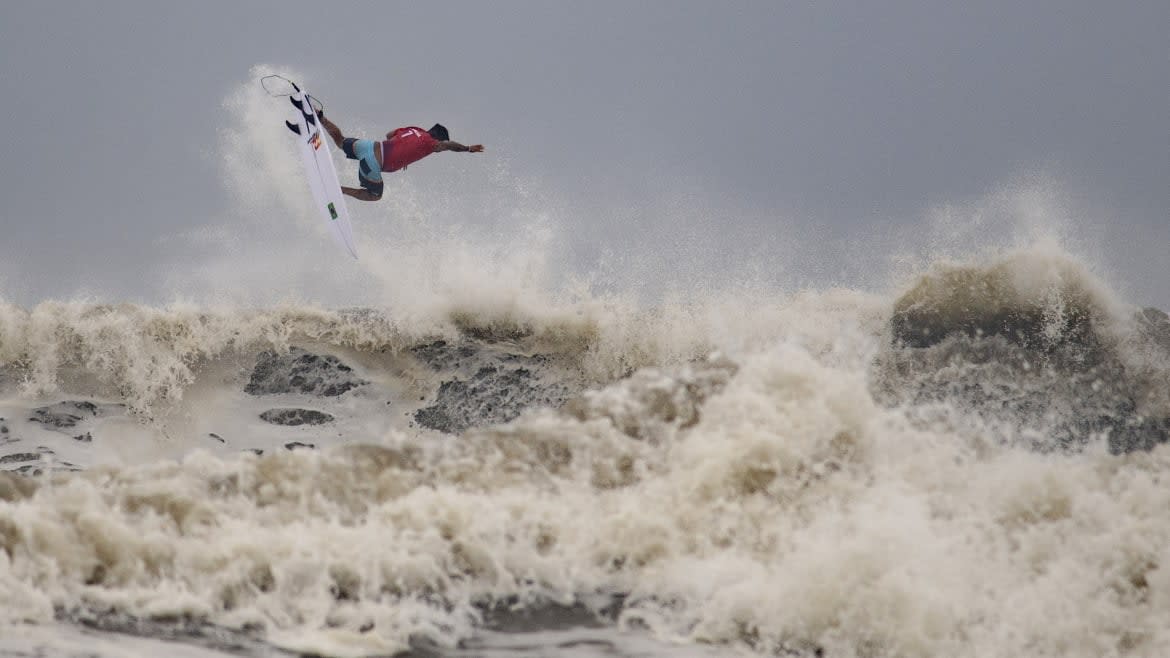A Typhoon, a COVID Peak, Devastating Exits—and Tokyo’s Olympic Surfing Is Awesome

When Olympic organizers heard Typhoon Nepartak was heading their way across the Pacific, it must have felt like a storm too far. Delayed for a year by a still-raging global pandemic and with athletes forced to compete in empty arenas, these Tokyo Games have had no luck.
But one group of athletes—in the brand-new Olympic sport of surfing—celebrated the news and even moved their gold-medal rounds forward by 24 hours to make the most of the perfect storm conditions. The result, with the three final rounds of the shortboard event crammed into a single day on big if messy swells on Tuesday, was spectacular.
WTF? Simone Biles Drops Out of Team Gymnastics Event Over Mystery Issue
The first medal to be awarded was in the men’s bronze-medal round. Australian Owen Wright, who had to learn to walk again after suffering a traumatic brain injury in an accident in Hawaii in 2015, celebrated more like he’d won the gold.
The actual gold-medal round pitted 23-year-old Kanoa Igarashi of Japan against the Brazilian world champion Italo Ferreira. The mop-topped, bleached-blond Igarashi was born and raised in Southern California to surf-mad Japanese parents. Ferreira, from northeast Brazil, caught his first wave at the age of 8 after his fisherman father lent him the foam lid of his fish box.
Despite breaking his board on the first wave, Ferreira, 27, rode the unpredictable, storm-churned waves calmly and with purpose to capture his sport’s first gold medal with a two-wave score of 15.14 to Igarashi’s 6.60.
Next up were the women and it was American Carissa Moore, the four-time world champion from Hawaii, who took the gold against Bianca Buitentag of South Africa, 14.93 points to 8.46.
Since the alerts were raised last week, Nepartak has been downgraded from typhoon to mere tropical storm, but was still expected to dump as much as six inches of rain and bring winds of up to 80 mph to the Tokyo area. Organizers have moved or rescheduled some outdoor events, in rowing and archery, as a precaution.
But the other storm threatening Japan shows no sign of subsiding. Tokyo on Tuesday recorded 2,848 new COVID-19 infections—the highest daily total recorded at any point during the pandemic. The city is in its fourth state of emergency, due to continue for another month.
Inside the Olympic “bubble,” however, the situation appears to be under control. A Tokyo 2020 spokesperson said that of 37,000 tests carried out on Olympic airport arrivals, only 30 had shown positive. Of 240,000 tests carried out among athletes, officials, staff, and volunteers, there have been only 52 positive cases, a positivity rate of just 0.08 percent.
That suggests that the stringent restrictions imposed by organizers—which have seen journalists locked in their hotel rooms and athletes warned repeatedly not to hug each other in victory or defeat—might be working.
That will come as little consolation to the Italian Angelo Bonomelli, who was offered a last-minute place in the surfing competition but couldn’t make it there in time.
Bonomelli told the Associated Press that a Portuguese surfer who dropped out the day before competition started should have come clean earlier about testing positive and had cost him a “lifetime opportunity.”
Get our top stories in your inbox every day. Sign up now!
Daily Beast Membership: Beast Inside goes deeper on the stories that matter to you. Learn more.

 Yahoo Movies
Yahoo Movies 
